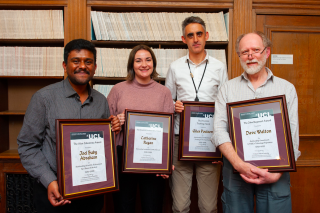Celebrating the stars of the Space and Climate Physics Department
8 December 2022
The Space and Climate Physics Awards took place on Wednesday 23rd November 2022 when staff and students assembled from across our two sites at Holmbury St Mary in Surrey.

In recent years, this event has been affected by Covid restrictions so everyone was delighted to be able to attend in person this year.
The awards celebrate outstanding achievement in scientific achievement for both students and researchers, commitment to our technology programme, excellence in delivering and supporting teaching and outstanding contribution to public outreach. They also memorialise past members of staff and family members of those staff are invited to present them.
This year, the Alan Johnstone award for scientific achievement by a student was won by Joel Baby Abraham for his work on the properties and energetics of the electron populations in the solar wind.
The John Raymont Award for Outstanding Commitment to MSSL’s Technology Programme went to Dave Walton who has worked for many years in the department, making significant contributions to PLATO, Sentinel 4, SMIILE, Solar C and countless other projects. He shares his knowledge freely and retains his positive attitude in spite of workload pressures.
Catherine Regan, a 3rd year PhD student won the Elizabeth Puchnarewicz Award for Outstanding Contribution to Public Outreach in recognition of her work organising two years of the annual ‘Science Week’, Eyes on Mars project, open evenings and the chairing of the MSSL Outreach Working Group.
Giles Poulsom, a member of the Technology Management Group was the recipient of the inaugural Director’s award for Outstanding Commitment to Teaching regarding his contribution to teaching across many of our MSc and apprenticeship modules. Giles was Programme Leader for the new Systems Engineering Master’s Degree Apprenticeship, sitting on UCL’s apprenticeship steering committee, supporting the Ofsted readiness working group and arranging for accreditation of the apprenticeship. Bearing in mind that UCL did not previously provide apprenticeships this has been an incredible achievement.
The winner of the Robert Boyd Award for Outstanding Scientific Achievement was Alessio Spurio Mancini for his work on machine learning emulation which is transformative and foundational for the next generation of cosmological experiments (Euclid, Roman, Rubin, SKA), and his approach is particularly innovative and interdisciplinary. He presented to the assembled audience regarding his CosmoPower paper, accepted this year, and the subsequent code release which show how novel machine learning approaches have sped up the inference of cosmological parameters by a factor of 10,000. Exploration of cosmological models that were before too computational expensive to consider are now testable, the inclusion of systematic effects in analyses is now possible, and the combination of many probes in a single analysis now plausible.
After the difficult and socially distant past 3 years, it was fantastic to see the Space and Climate Physics department community back together once again and celebrating the outstanding achievements of our colleagues.
 Close
Close

